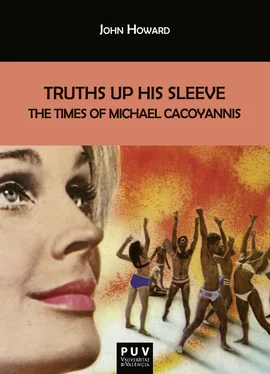1 ...8 9 10 12 13 14 ...19 Whereas one Henry Tudor, aka King Henry VIII, married six times, with requisite annulments and occasional beheadings, furthermore declaring himself Supreme Head of a new Protestant denomination, one Edward Windsor, aka King Edward VIII, married just once. But scandal of all scandals, his wife had been divorced. Twice. To make matters worse, Wallis Simpson was an outspoken American, whose judgment Edward trusted. Though Britain lacked a constitution, constitutional crisis ensued. Edward abdicated, handing over the royal reins to Bertie. 43
Of course, many principled individuals have refused the royal honors bestowed upon them, often in protest against empire, monarchy, aristocracy, and unearned inherited privilege. Among the dissenting artists, writers, actors, and directors Michael admired were Francis Bacon, Alan Bennett, Aldous Huxley, Glenda Jackson, Ken Loach, L. S. Lowry, J. B. Priestly, Tony Richardson, and Virginia Woolf. There was never any question of Michael’s father declining the knighthood. He accepted with glee. Then, eager to return to London for the 1937 coronation, he would indulge in more debauched nightlife and still find time to chart the future of his children—and their children. The “precedences, privileges, and advantages” referenced in the royal decree were substantial. Most of all, he wanted his offspring to make the most of preferences given by the nation’s top institutions of higher learning. Sir Panayiotis had his eye on a particular law school in central London, far superior to La Salle Extension University. His effete eccentric elder son Michael would have to forget about that career in theatre. 44
*
As we’ve seen, over the 1920s and 1930s, Michael Cacoyannis was raised and schooled on the small but strategically important island of Cyprus with considerable resources at his disposal. Born into an aspiring middle-class family of Greek descent, he grew up with many advantages, including reliable food, clothing, and shelter. He benefited from decent healthcare, varied education, and extracurricular activities to sustain and excite both mind and body. Parental discipline extended to “severe” corporal punishment, so Michael and his older sister continually escaped to the comforting liberal-minded all-female household of their maternal grandmother and unmarried aunts, who valued wide reading, free thought, and open inquiry.
The Cacoyannis family rented their flat, as money flowing into the household flowed out faster. Crucially for Michael and sister Stella, the flat balcony looked across Otto and Amalia Street into an outdoor cinema and onto its screen. Its music then dialogue filled the night air every year from mid-spring to mid-autumn. Aside from the capital Nicosia, Limassol was home to more indoor cinemas than any other town on the island. As the Cacoyannis kids matured into teenagers, silent film then talkies depicted worlds and imparted wisdom often at odds with their father and their schools.
Their “terribly conservative” father enrolled Michael and George, Stella and Yannoulla, in the Greek Gymnasium and the English Girls College respectively, keeping the boys close to home in Limassol, sending the girls farther afield of Terra Santa for schooling and “finishing” in Alexandria. The very names of these three schools signaled their father’s national, religious, and racial prejudices. On this diverse island split off from the Anatolian/Middle Eastern/Western Asian mainland—with its multifaith, multiracial, multilingual populations—Sir Panayiotis insisted his children look to Greece and England as fonts of white Christian European civilization.
Ironically, as Michael and Stella soon would discover, historic Cypriot ties to Britain were not a reliable predictor of cross-cultural amity. Moreover, claims of Greek ancestry could not forestall white racism or imperial scorn in the London metropole, with its long history of dominion over vast expanses of earth. In advance of his bloodthirsty military campaigns, British imperialist Herbert Kitchener had mapped various parts of the empire, detailing their exploitable natural resources and—less reliably—commenting on their peoples. In Cyprus, Kitchener described a crude racial division between Turks and Greeks, the former “peaceful, moderately honest, and industrious,” the latter “stupid[,] bad workers, shirking as much as they can.” These ostensibly innate differences he applied to males alone. Ever incongruous, as racist reasoning is, he lumped the attributes of Cypriot females, by contrast, into one misogynist basket. “The women of both races are not at all prepossessing; it is rare to see a face even tolerably good-looking, and their figures and voices are very objectionable. The Turkish women veil their faces, which is an advantage.” Published in Blackwood’s Magazine in 1879, such racist stereotypes circulated far and wide in the late nineteenth century. They were re-circulated as Britain strengthened its grip on the island in the twentieth century. Indeed, these ideas were fundamental to imperial discourses designed to demean and belittle locals, thus justifying the entire enterprise of violent exploitation, including gendered and sexualized subordination. When Stella and Michael arrived in the metropole, they would face numerous obstacles. For Stella, the hurdles would be even higher, born of institutionalized sexism. As Michael resisted the path his father mapped out, straying into suspect professions and into criminalized leisure activities, he too would face additional impediments. 45
A fey boy more interested in cosmetics than football, theatre than fishing, Michael in his early years took courage from Broadway and Hollywood director George Cukor. One generation older than Michael, Cukor had pursued the sorts of stage and screen careers Michael longed for. Like Cukor, Michael had grown up in “relatively modest circumstances.” He was “raptly devoted” to his mother, and “his keen observation of her mannerisms and reactions” helped him make many female friends and later supervise women in various capacities. With his first forays in the performing arts—in backyard skits, school plays, dramatic readings, touring production audiences, and soon London’s West End—Michael “found that he was intoxicated by life in the theatre. He loved the community and camaraderie.” Through diva worship of screen idols Garbo and Dietrich, no ordinary pin-ups, Michael learned how to read, as he furthermore discovered that wearing a tuxedo as a young man or woman produced remarkably different outcomes and possibilities. When the movie magazines circulated incredible stories that Garbo and Cukor were a couple, Michael paid heed and took note. Though he understood what “marriage of convenience” meant, the phrase “lavender marriage” was not known to him. Yet. 46
For now, Michael still had his father to deal with. This formidable man, further empowered as a knight of the realm, dictated Michael’s future, as he deplored his son’s effeminacy and theatrics. Like Cukor, Michael “was expected to follow family tradition and become a lawyer, a safe bourgeois occupation. The profession of stage director was from the family point of view … equivalent to a drug pusher or bookie.” Inexpert gamblers at poker and bridge, Panayiotis and Angeliki would take no such risks with their youngsters' lives and livelihoods. Father knew best. The children would obey. 47
CHAPTER 2
Metropolitan Broadcast Performances
Conservative to the core, downright sexist, P. Cacoyannis instructed his overachieving eldest child Stella to become a secretary, his fey son Michael to train as a lawyer. After his 1936 knighthood, Cacoyannis père could pave the way for his children in the London metropole. In point of fact, he insisted on it. In the beginning at least, they complied. 1
Читать дальше











